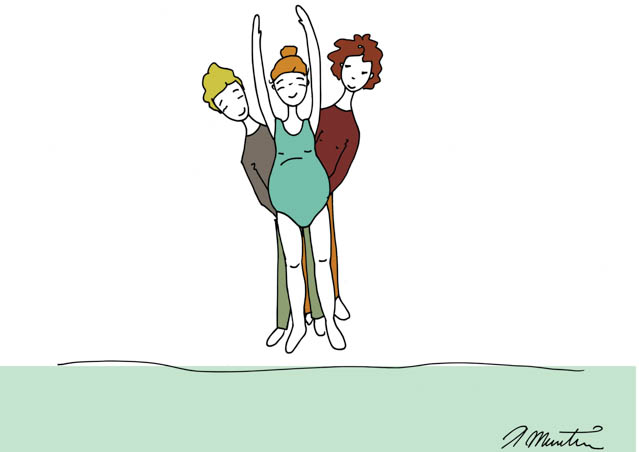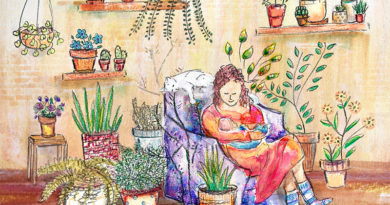Doulas – Beautiful Caregivers
The word doula (doo-la) is a Greek word that means “woman servant or caregiver.” Today it mostly refers to someone who offers emotional, physical and practical support to a woman and her partner before, during and after childbirth.
Webster’s Online Dictionary defines “caregiver” as both “a person who helps in identifying or preventing or treating illness or disability” and “a person who is responsible for attending to the needs of a child or dependent adult.” Pregnancy is no longer considered a condition or a disability, although those TV shows depicting labouring women in wheelchairs might make you wonder!
During pregnancy, I was dependent on all my various caregivers, because I’d gone through a complicated pregnancy, had never been pregnant before, and needed to know that all was well with me and my little one.
As I gave birth in Australia with my Swiss husband by my side, we hired a German-speaking doula, so that my husband would understand everything, should anything urgent need to be discussed or decided on The Day. During labour, I was dependent on her, because the frontal lobe of my brain was flooded with beta-endorphin and my rational brain went on holiday – just as it should do – and no rational sentences could be composed, let alone decisions made! Our doula was like our soldier and our guardian angel, incredibly important as the interface between us and our caregivers at the hospital, all of whom were carrying their own stories, beliefs, and quite likely hospital protocol lists of what my labour should look, sound, and feel like.
You may choose as your doula your best friend, your mother, or anyone else whom you trust. However, when a professional, trained doula comes to support you during birth, it has been proven to optimise the outcome for women and their babies. The study “Continuous Support for Women During Childbirth” published by The Cochrane Review tells us that if a labouring mother is continuously supported by someone outside her own social network and not a member of hospital staff, she is more likely to have a spontaneous vaginal birth and a shorter labour; furthermore, she is less likely to use medication, have a caesarean section, or have an instrumental delivery.
Once a couple decide to work with a doula, they usually interview a few until they find one they feel comfortable with. You’ll know when you’ve found her, because you will feel that warm, connected “click.” Many couples worry that her presence might disturb the intimacy that birth offers so, to allay those fears, she will obtain a very clear understanding of just how much the partner wants to participate and will respect the couple’s requests at all times.
Because they don’t perform any medical tasks, doulas are available to provide continuous physical and emotional support for the duration of labour. So, if an unexpected circumstance arises (e.g., if labour is very long or particularly powerful) the couple is freed up to deal with it in the way they feel is right for each of them at the time – this may differ somewhat from what they might have expected. The doula is always there to support them on their journey.
As the only constant companion, outlasting multiple hospital staff shift-changes, the doula helps maintain a harmonious relationship between the couple and staff. With a doula present, the couple is free to experience the birth of their baby as fully as possible without worrying about anything else. And if you do have worries, your doula will do everything in her power to rectify them.
The beautiful doula’s role extends into the postpartum period, too. Some offer just partial services (e.g., postnatal doula). Some doulas study to become qualified breastfeeding consultants and others can provide guidance or referrals for new parents. Although in Switzerland we are blessed with multiple postpartum visits from a midwife, a doula may also offer good conversation while making you a cup of tea, putting on a load of washing, and cooking you a meal, or she may just hold your baby while you sleep or wash your hair. Most health insurers currently partially cover postnatal doula services, so call yours to check.
A good place to start looking for a doula in Switzerland is www.doula.ch. There are many wonderful doulas in Switzerland who aren’t members of the Doula Verein (Doula Association) or listed on this website, so make use of referrals from your online mums’ groups. Many Swiss doulas speak English, so don’t hesitate to get in touch to ask, even if their websites aren’t in English.
My birth experience was empowering and life changing and it has led me to the work that I now do and love. 53-kilogram me was carrying a 4.9-kilogram (10 pounds, 8 ounces) baby, yet I had full faith in my body’s ability to open to birth with ease. This was because I had no fear, thanks to my birth preparation course and because I surrounded myself with the unconditional support of my husband and my “beautiful caregiver,” my doula.
Thanks to Mary Kalau and Monika Maccioni-Meier for their assistance in the writing of this article.
By Michelle Seaton Witte
Michelle is a She Births® accredited birth educator, birth preparation yoga teacher and hypnotherapist in training in Zurich. Find out more at www.michelleseatonwitte.com and on her Facebook page.
Illustration by Laura Munteanu
Laura has studied Journalism and Advertising, and has been working as a journalist and an illustrator. She has been illustrating for magazines, websites, charity and diverse campaigns. She lives in Zurich with her husband and eight-year-old daughter.




